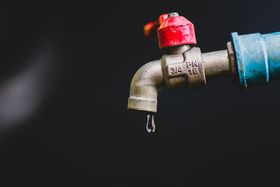What Is the Best Salt for Water to Enhance Hydration?
Not sure which salt to put in your water for hydration? Some are more useful than others, but not for the reasons you might think.
Published May 6, 2025

You’ve probably heard the tip to add a pinch of salt to your water for better hydration. But is all salt equal when it comes to rehydrating the body? And how does it actually help?
Let’s explore how hydration works, what minerals your body needs to hold onto water, and which types of salt truly improve hydration.
» Improve your water's hydration potential with MAYU's electrolyte drops
Why Water Alone Isn’t Always Enough
Hydration isn’t just about drinking more water. It’s about how well your body absorbs and retains that water.
Water moves in and out of your cells through a process called osmosis. This happens across cell membranes based on the concentration of minerals like sodium and potassium inside and outside the cells[1].
If the concentration becomes unbalanced, cells either shrink (dehydration) or swell too much (overhydration), both of which affect how well they function.
Sodium and chloride are mostly outside the cells Potassium is mostly inside. These minerals work together, managed by sodium-potassium pumps in cell membranes, to keep fluid levels balanced.
» Discover the benefits of electrolyte water
The Key Minerals for Hydration
Some salts contain more than just sodium. Here's how the main minerals in hydration salts support fluid balance:
- Sodium: Sodium is essential for pulling water into the bloodstream and maintaining the pressure needed to move fluids into and out of cells. It’s half of the driving force behind osmosis. Without enough sodium, your body can’t absorb water effectively, which can lead to cramps or fatigue.
- Potassium: Potassium works inside the cells. It helps maintain the resting membrane potential, allowing nerves to fire and muscles to contract. It also balances the effects of sodium, helping reduce bloating and keeping blood pressure in check.
- Chloride: Chloride teams up with sodium to regulate osmotic pressure and maintain the neutrality of body fluids. It’s also vital for producing stomach acid and keeping your digestive system running smoothly.
- Magnesium: Magnesium helps convert food into energy, supports nerve function, and reduces muscle cramps. It also enhances insulin sensitivity, helping to manage blood sugar, which is important during endurance activities[2].
» Learn about the difference between electrolytes and minerals
Comparing Different Salts for Hydration
So, which salt should you put in your water? Here’s how the most popular types compare.
Table Salt (Iodized Salt)
Regular table salt is mostly sodium chloride, with added iodine to prevent deficiency. It does help with hydration by replacing sodium lost in sweat.
In fact, oral rehydration therapy in many parts of the world relies on table salt mixed with sugar and boiled water. It’s simple, accessible, and effective in emergency dehydration.
However, it lacks other minerals like potassium or magnesium, which means it’s less balanced than natural salts. It works—but it’s basic.
» Is salt an electrolyte? Let's find out.
Himalayan Pink Salt
Himalayan salt looks pretty and contains trace amounts of minerals like calcium, iron, magnesium, and potassium[3]. But the amounts are very small—so small, in fact, that they don’t significantly contribute to your daily needs.
There’s no strong evidence that Himalayan salt hydrates better than table salt. It has a slightly different mineral profile, but the impact on hydration is minimal.
» Learn how to remineralise RO water with Himalayan pink salt
Celtic Sea Salt
Celtic sea salt is known for its slightly damp texture and greyish hue. It contains more sodium per gram than Himalayan salt and trace amounts of minerals like magnesium and calcium.
Some people claim its moisture content helps absorption. But research doesn’t back up these claims. The trace minerals are, again, present in very small amounts.
Some studies even suggest that sea salt impurities might negatively affect kidney function or gut health if consumed in large amounts[4].
» Celtic Salt vs. Himalayan Salt: Which One Is Better for Electrolytes?
Redmond Real Salt
Redmond Real Salt is an unrefined salt from Utah, with natural trace minerals and no additives. However, there’s no independent research confirming its benefits for hydration specifically.
It may be a clean option if you want an unprocessed salt, but don’t expect dramatically better hydration results.
Specialty Salts (Black Lava Salt, Fleur de Sel, Bolivian Rose Salt)
These gourmet salts are used more for flavour and appearance. While they may contain trace minerals or activated charcoal, there’s no scientific evidence supporting their use for hydration.
They're interesting in the kitchen but inconsistent for replenishing electrolytes.
What About Hydration-Specific Salts?
Products like LMNT, SaltStick, and other electrolyte formulas are designed to replace the exact minerals lost through sweat—especially for athletes or those on low-carb diets[5].
LMNT, for example, contains:
- 1000 mg sodium (from sodium chloride)
- 200 mg potassium (from potassium chloride)
- 60 mg magnesium (from magnesium malate)
That’s a well-balanced mix for people exercising hard or sweating heavily. It also avoids sugar, which some prefer.
On the other hand, salt tablets can raise sodium levels but aren’t proven to prevent cramps or illness during endurance events. More important is your total electrolyte and fluid balance, not just the sodium dose.
» Discover how electrolytes fight fatigue and boost energy
So… What’s the Best Salt for Hydration?
There’s no single “best” salt. What matters most is sodium content, and all salts provide that.
Natural salts like Celtic or Himalayan add trace minerals, but the amounts are too small to make a big difference in hydration. Table salt is just as effective for most people, especially when paired with potassium-rich foods or electrolyte drinks.
During long workouts or hot conditions, it’s best to focus on:
- Sodium (300–1000 mg/hour)
- Potassium (200–400 mg/hour)
- Magnesium (if you're prone to cramps)
- Small amounts of glucose (10–20g/hour)
» Let's investigate the best types of water to drink when dehydrated
Beyond Salt: How Else Can You Stay Hydrated?
Here are a few other ways to boost hydration without overloading on salt.
1. Add a Little Glucose
Adding glucose (sugar) helps water and sodium absorb faster through the gut. That’s why oral rehydration solutions often combine sugar with salt.
A pinch of sugar with a pinch of salt in water can be more hydrating than water alone, especially during extended sweating.
2. Eat Potassium-Rich Foods
Bananas, avocados, spinach, and coconut water are great sources of potassium. These foods help balance your sodium intake and support fluid movement in and out of cells.
3. Drink by Thirst, Not by the Clock
Overdrinking water without electrolytes can lead to hyponatremia (low sodium levels), especially during long events. Listen to your body. If you're thirsty, drink. If you're not, don’t force it.
» Here's what happens when you drink too much water
How Do Mayu’s Electrolyte Drops Compare?
Mayu’s Electrolyte Drops provide a clean blend of sodium (70mg), chloride, zinc, and magnesium—perfect for supporting hydration throughout the day.
They’re designed to gently replenish electrolytes without overwhelming the body, making them ideal for everyday wellness, travel, or light activity.
The added zinc and magnesium may help with energy levels and muscle support, and because they come in liquid form, they’re easily absorbed and simple to use on the go.
The Simple Truth About Salt and Hydration
Salt can help you stay hydrated, but not all salts are created equal. And no salt, on its own, is a miracle solution.
Whether you choose table salt, sea salt, or an electrolyte blend, the key is balance. Look for sodium, potassium, and a touch of glucose if you’re sweating a lot. Otherwise, eat well, stay mindful of your body’s needs, and drink when you’re thirsty.
For an easy, effective option that fits into any routine, Mayu’s Electrolyte Drops offer a gentle blend of essential minerals in every sip—no mixing, no fuss.
References
“Body fluids and fluid compartments | Anatomy and Physiology II.” Available: https://courses.lumenlearning.com/suny-ap2/chapter/body-fluids-and-fluid-compartments-no-content/
L. K. Mahan and S. Escott-Stump, “Book Review: Krause’s food, nutrition and diet therapy, 10th edn,” Clinical Nutrition, vol. 19, no. 2, pp. 141–142, Apr. 2000, doi: 10.1054/clnu.2000.0105. Available: https://doi.org/10.1054/clnu.2000.0105
F. Fayet-Moore et al., “An analysis of the mineral composition of pink salt available in Australia,” Foods, vol. 9, no. 10, p. 1490, Oct. 2020, doi: 10.3390/foods9101490. Available: https://pmc.ncbi.nlm.nih.gov/articles/PMC7603209/
L. Bankir, J. Perucca, P. Norsk, N. Bouby, and M. Damgaard, “Relationship between Sodium Intake and Water Intake: The False and the True,” Annals of Nutrition and Metabolism, vol. 70, no. Suppl. 1, pp. 51–61, Jan. 2017, doi: 10.1159/000463831. Available: https://pubmed.ncbi.nlm.nih.gov/28614828/
G. S. Lipman et al., “Effect of sodium supplements and climate on dysnatremia during ultramarathon running,” Clinical Journal of Sport Medicine, vol. 31, no. 6, pp. e327–e334, Feb. 2020, doi: 10.1097/jsm.0000000000000832. Available: https://journals.lww.com/cjsportsmed/Citation/2021/11000/Effect_of_Sodium_Supplements_and_Climate_on.15.aspx
Disclaimer: The information published by MAYU Water is not a substitute for the expert knowledge, advice, and recommendations of trained professionals. We strongly recommend consulting with industry experts and primary or scientific sources before making any health, research-related, or other important decisions.















































